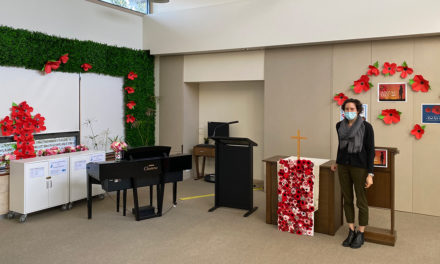Australia’s Aged Care System: Challenges and Opportunities is the title of a forum run by the Mount Waverley Cluster Adult Growth and Development Group and Social Justice and Mission in Society Committee. It was our first forum held live at St Luke’s since the Covid-19 pandemic, and the first held both at the Church and online via Zoom. We heard three very informative talks packed with personal anecdotes and reflections on aged care policy, the role of the Church in aged care, and the theology of ageing. The three speakers were Dr Alan Wilkinson (former Chair, Uniting AgeWell Board), Rev Clare Brockett (Director of Mission, Uniting AgeWell) and Ms Diana Cerini (Care Advisor in Community Home Care, Uniting AgeWell). The proceedings ended with a personal overview by Rev Anneke Oppewal (Presbytery Minister Pastoral, Presbytery of Port Phillip East). Our Host for the event was Rev Julie Ross.
The speakers raised a number of challenging questions, which were discussed in small groups by those attending. One such question was: ‘Do you think aged care should still be a central part of the mission of the church in the Synod of Victoria and Tasmania?’ There was strong support for this to continue, based on several considerations. For example, it was noted that the church has years of experience in the delivery of aged care (dating back to 1947 in Victoria) and has a very good track record. It was noted that the church follows the requirements for staffing numbers and ratios of Registered nurses and Certificate lll Healthcare workers. It was also noted that during the COVID-19 pandemic in Melbourne in 2020, there was no transmission to residents. Another consideration in favour of the Church continuing its involvement in aged care, was that a church-based operation can offer something to those needing spiritual care. Rev Brockett made the point that of the forty-four requirements that make up the government’s 2019 Aged Care Quality Standards, spirituality occurs in almost half those requirements in very specific ways.
Another question was: ‘Is your congregation involved in any way with the Uniting AgeWell facility in your locality? Would you think that would be a useful step?’ Just as there was support for the Synod remaining in aged care, so there was strong support for congregations to be involved. However, many were unclear about how to go about this. It was acknowledged there is some involvement at the congregation level by Ministers and a few lay volunteers, but it was felt more could be done to facilitate greater involvement at the congregational level. One suggestion was that there could be information on volunteering on display in church foyers or libraries.
Another engaging question was: ‘What does your vision of dignity and respect in aged care look like?’ A central point here was acknowledging the right of a person to be valued and respected for their own sake; as an individual with their own needs and wants, likes and dislikes. This approach may involve allowing people to make their own choices where possible, acknowledging and enhancing their potential for creativity and meaningful relationships, and so on. It is consistent with the 2019 Aged Care Quality Standards which, as Rev Brockett noted, signalled a significant shift from a task-based, clinical model of care to a more holistic, person-centred model, where the focus is on choice, needs, preferences and, more generally, on spiritual care.
Thank you to all of those who took part – speakers, participants, and organizers – for the effort they put into making the Forum a success. Thank you also to those who attended (in person and online) and took part in the discussions.
John McKie

